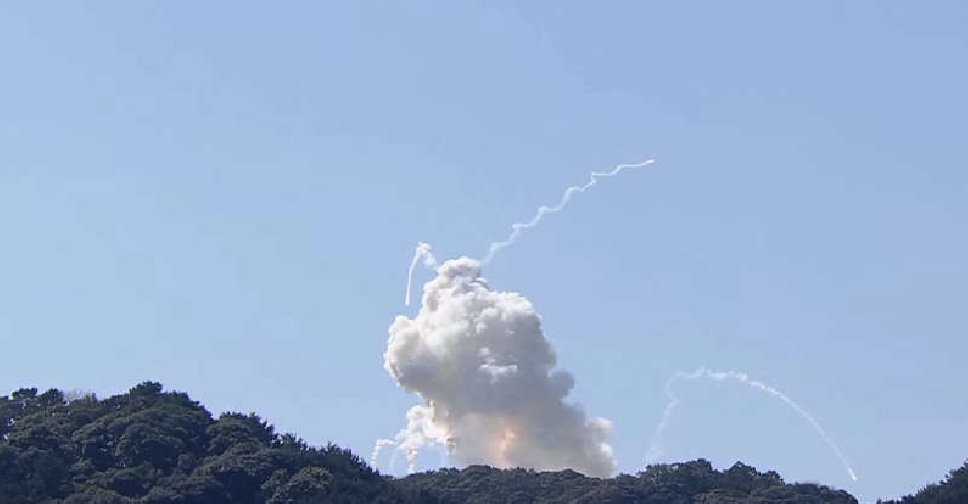
Kairos, a small, solid-fuel rocket made by Japan's Space One, exploded shortly after its first launch on Wednesday as the firm tried to become the first Japanese company to put a satellite in orbit.
The 18-metre rocket exploded seconds after lifting off at 11:01 am (0201 GMT), leaving behind a large cloud of smoke, a fire, fragments of the rocket and firefighting water sprays near the launch pad, visible on local media livestreams.
Space One said it "terminated the flight" after the launch on the tip of mountainous Kii peninsula in western Japan and was investigating flight data.
Shuhei Kishimoto, governor of local Wakayama government, told reporters after being briefed by Space One that a problem triggered the autonomous flight-termination system. He did not specify what the problem was. There were no injuries near the launch pad, and the fire has been extinguished, Kishimoto added.
Space One has said the launch is highly automated, including the flight-termination function, and requires roughly a dozen staff at the ground control centre.
Kairos carried an experimental government satellite that can temporarily replace intelligence satellites in orbit if they fall offline.
Space One had planned the launch for Saturday but postponed it after a ship entered the nearby restricted sea area.
Although Japan is a relatively small player in the space race, the nation's rocket developers are scrambling to build cheaper vehicles to capture booming demand for satellite launches from its government and from global clients.
Tokyo-based Space One was established in 2018 by a consortium of Japanese companies: Canon Electronics the aerospace engineering unit of construction firm Shimizu and the state-backed Development Bank of Japan. Two of Japan's biggest banks, Mitsubishi and Mizuho also own minority stakes.
Shares in Canon Electronics fell as much as 13 per cent, while IHI shares were down as much as 2 per cent after Wednesday's failed launch.
Space One wants to offer "space courier services" to domestic and international clients, aiming to launch 20 rockets a year by the late 2020s, its president Masakazu Toyoda has said. Although the company delayed Kairos' inaugural launch window four times, it said orders for its second and third planned trips have been filled, including by an overseas customer.
Kairos is composed of three stages of solid-fuel engines and a liquid-fuel post-boost stage engine, attempting to carry payloads of up to 250 kg to low-Earth orbit.
Space One does not disclose Kairos' launch costs, but company executive Kozo Abe said it is "competitive enough" against American rival Rocket Lab.
Rocket Lab has launched more than 40 Electron small rockets from New Zealand since 2017 at roughly $7 million per flight. Several Japanese companies have used Electron for their missions, including radar satellite makers and Synspective, and orbital debris-removal startup Astroscale.
Last month, state-funded Japan Aerospace Exploration Agency (JAXA) successfully launched its new cost-efficient flagship rocket, the H3. JAXA completed a historic "pinpoint" moon landing this year, and the H3 is scheduled to carry about 20 satellites and probes to the space by 2030.
Before that, however, JAXA had faced a series of setbacks. H3's inaugural flight failed last year, as did another flight of a smaller rocket, Epsilon, in 2022. In July 2023, an upgraded engine for Epsilon exploded at JAXA's testing site.
In 2019, Interstellar Technologies conducted Japan's first privately developed rocket launch with its MOMO series, although without a full-scale satellite payload.
Partnering with the United States, Japan is seeking to revitalise its domestic aerospace industry to counter technological and military rivalry from China and Russia.
The government last year promised "comprehensive" support for space startups with technology critical for national security, as it seeks to build satellite constellations to ramp up intelligence capabilities.
Japan's defence ministry on Friday said it had struck a deal with Space One to boost its rockets' payload by experimenting with fuel-efficient methane engines.
 UK inquiry finds 'chilling' cover-up of infected blood scandal
UK inquiry finds 'chilling' cover-up of infected blood scandal
 Iranian President Raisi killed in helicopter accident, state media says
Iranian President Raisi killed in helicopter accident, state media says
 ICC prosecutor seeks arrest warrants for Israeli, Hamas leaders
ICC prosecutor seeks arrest warrants for Israeli, Hamas leaders
 Assange given permission to appeal against US extradition
Assange given permission to appeal against US extradition
 Israel intends to broaden Rafah sweep, Defence Minister tells US
Israel intends to broaden Rafah sweep, Defence Minister tells US




